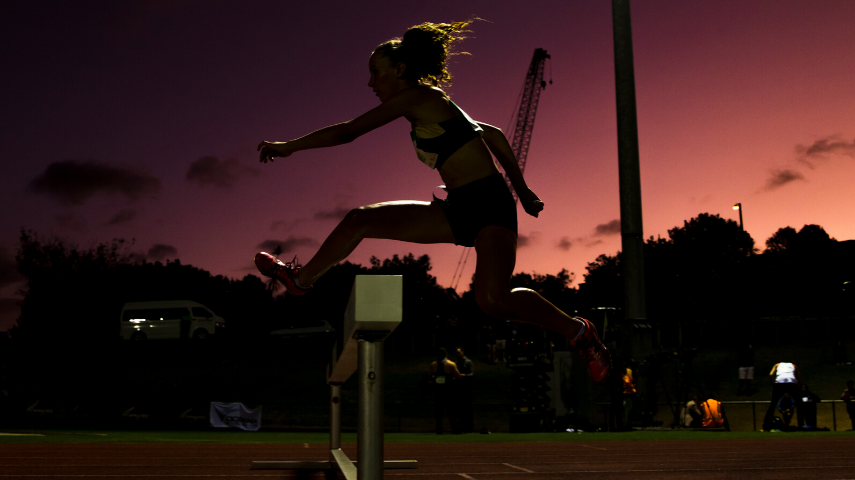News & Updates
Coaching during a Lockdown

Not only the athletes but New Zealand’s many coaches have also had to show remarkable adaptability and versatility during lockdown. Steve Landells speaks to a quartet of Kiwi-based coaches to find out more.
Dale Stevenson
As the personal coach to a core group of around half a dozen athletes including three-time world (one outdoor and two indoor) shot put champion Tom Walsh, Dale Stevenson has tried to ensure his athletes remain as fit as possible during lockdown.
“I hope when training resumes (back to normal), that it is a step back in for us and not a step back,” explains Dale, Athletics NZ’s lead throws coach. “So when they return to normality, rather than having done very little training they feel like a full-time athlete.
“At this stage an athlete cannot win an Olympic Games, a World Juniors, a Commonwealth Games or a World Championships but they can certainly lose it, so it is about mitigating some of those risks.
“It is about making sure athletes still feel like athletes and they have something to get up for each day such as completing their training diary like they normally would.”
Dale says the initial challenge was coping with New Zealand’s rapidly changing circumstances – as the country went from an alert level two status to an alert level four in a 48-hour period.
For the athletes remaining in Christchurch such as Tom, this period of time was used to frantically source gym equipment to be transported to their homes.
For others, such as 2019 New Zealand U20 shot champion Nick Palmer and Ryan Ballantyne, the 2020 New Zealand senior shot bronze medallist, who headed back to their family homes in the Hawkes Bay and Waikato, respectively, it was helping supply the pair with training implements.
Dale has been hugely impressed by the innovative approach to training adopted by many in his group. Ryan and his family have set up a home throwing pad in the cow shed while another of the athletes he works with – 20-year-old Lexi Maples – has constructed a hammer out of an old kettle bell.
Yet for Dale one of the big challenges has been communicating effectively with his athletes.
“There’s been a lot of Zoom calls, WhatsApp messages and videos back and forth,” he explains. “But one of the most challenging elements has been orchestrating their respective teams and making sure that all the athletes have a good network of support staff, including strength and conditioning coaches, nutritionists, sports psychologists etc. Communication is slower and takes more effort than in the past. You don’t get the hallway conversations or the time in the gym together. You have to carve out time to make sure everyone is okay and on the same page.”
Besides the communication challenges, Dale believes training during a lockdown requires a lot more self-direction from the athletes.
He used the example of Ryan, who is improvising by lifting sandbags on the farm. While Dale fully acknowledges the lengths the 19.85m shot putter is going to maintain fitness, lifting sandbags presents certain imponderables for the coach.
“I don’t know how much the sandbags weigh and neither does Ryan, so trying to put a training programme around that is nearly impossible,” adds Dale. “Trying to entrust in people to make the right judgement call has been a big adjustment.”
Overall, Dale has been immensely satisfied with how professionally his athletes have adapted to the radical changes of training under lockdown, but he also understands how maintaining social connections between athletes during training is critically important.
“An often overlooked component (to training) is having another athlete push you,” he adds. “It can be quite profound. The other day I organised a shared training session online, which helped raised the standard (of the training). It is important to stay in touch. If you are isolated and no-one is cracking the whip, then standards can drop. That is not laziness, that is just human nature. If we can try and leverage that positively we can mitigate some of that risk.”
Kirsten Hellier
Athletics NZ’s recently appointed Coach Development Lead believes despite the coaching challenges under an alert level four lockdown, she has been impressed by the high levels of engagement within the athletics community
Auckland-based Kirsten coaches around 20 athletes, led by NZ senior women’s discus champion TeRina Keenan – although the bulk of her athletes are younger grassroots performers.
The demands of coaching a sizeable group of athletes during lockdown can be extensive with added complications caused by the fact each individual athlete trains in a separate environment.
“Coaching TeRina, for example, is very different to coaching the younger generation,” she adds. “TeRina is a police officer with time constraints. TeRina needs to look after herself and stay safe and well in her bubble but also keep up some level of activity.”
However, for her younger athletes, Kirsten, a former coach to two-time Olympic shot champion Dame Valerie Adams, believes it is important to keep training fun.
“Similar to the message (psychologist and TV presenter) Nigel Latta gives around parenting their kids at school, it is important to keep training light, and if they do it, they do it.”
To maintain engagement Kirsten has set up a Facebook group entitled We-Fit, where she and her husband have posted workout videos, individual programmes and set weekly challenges.
So far the Facebook page has proved a big success with the interaction reach beyond that of the athletes.
“To be honest, the kids are teaching the parents and parents are getting involved in the workout videos, which is great,” she adds.
In Kirsten’s role as a coach development lead, she has also taken time to reach out to other athletics coaches in the NZ athletics community to see how they are tracking in these challenging times.
She has been impressed with how they have coped during lockdown while the greater periods of downtime many of us are experiencing has presented some unexpected and welcome engagement.
“I sent a survey out to coaches and got more than 200 responses, which was fantastic,” she explains. “Would I have got that response had the status quo been the same, possibly not? I probably had more of a captive audience with a bit more time on their hands.”
Steve Willis
The Athletics NZ lead distance coach views the current lockdown as an opportunity which could lead to multiple long-term benefits for the New Zealand endurance community.
Steve believes with the timing of the lockdown coming at the tail end of the domestic season and with the international season in the Northern Hemisphere severely impacted, this can work as an advantage for Kiwi runners.
“Top New Zealand distance athletes often go from domestic season, international season, domestic season followed by international season,” explains Steve. “This is demanding on the body, but the lockdown and likely lack of international events means this presents a chance for athletes to put base work into the tank which could have benefits for three to four seasons to come.
“Many athletes I’ve coached have had their best racing block when they’ve done a period of uninterrupted training without the pressure of high intensity, high density race specific training.
“With racing off the cards for a while, I think across the board we will see a jump in performance, especially in the distance space for athletes who have allowed their bodies to rest and recover.”
Steve also believes the current period could bring about the opportunity to review the current domestic calendar.
He believes there is room for debate on the current track, cross country and road season and how it could perhaps work more effectively for the athletes to deliver a better standard of performance.
“Like in every part of society we don’t need to return to the same position post Covid-19,” he explains. “We have an opportunity to look at what might work and what doesn’t.”
In a broader sense, Steve believes there will be some transfer growth into running – being one of only a handful or sporting activities which people are currently allowed to carry out – which may also bring long-term benefits for the sport.
“I think we’re seeing more people getting into running because it’s one of the few sports you can actually do during lockdown. So we, as a sport, need to be ready to take advantage of that,” he adds.
Kerry Hill
Bay of Plenty-based coach Kerry Hill believes the time in lockdown has presented a golden opportunity for his athletes to focus on training like never before.
The hugely experienced coach, who has previously coached in Qatar and Singapore, says: “With no events on, we are seeing this as an opportunity to train all day, what we are calling the ‘world’s best training camp’.
“We have set up a closed Facebook page where we are filming workouts for the athletes and they in turn are filming their workouts. They can choose whatever is suitable for them, but they must be aware of the “squad guidelines” pattern they are using. In this process they are learning how to implement not only a durable but also a balanced programme and it gives them some personal responsibility for what they are doing and a greater understanding of the science behind training.”
Kerry himself believes the time during lockdown has given him more time in the “rocking chair” to read more coaching research, listen to more podcasts and enhance his coaching knowledge but he also accepts that lockdown has presented some big challenges.
Communication with his athletes, which would typically be carried out face to face in training, is now often executed “virtually” – which is far from straight forward, according to Kerry.
“The kids I coach use a wide cross section of communication tools,” explains Kerry. “We have Zoom meetings, Microsoft team meetings, texts and a closed Facebook group and some of them hardly ever use emails. Coaches need to modernise in more ways than simple methodology.”
Besides the technological communication challenges another obstacle to effective coaching in lockdown is adapting to the differing environments each athlete is currently experiencing.
“Some can sprint on the sand, others on a grass track and some might have to sprint uphill on the road,” explains Kerry. “Brooke is doing all her training in the family orchard while Tayla Brunger (the NZ U20 200m champion) in Whanganui has managed to set up a mini-gym in her garage.”
Piecing together effective programmes for all his athletes requires great mental agility from Kerry and great commitment from his athletes but like any good coach he is finding a way to navigate a route through the various challenges.
“Good communication is key because it aids with motivation,” he adds.
